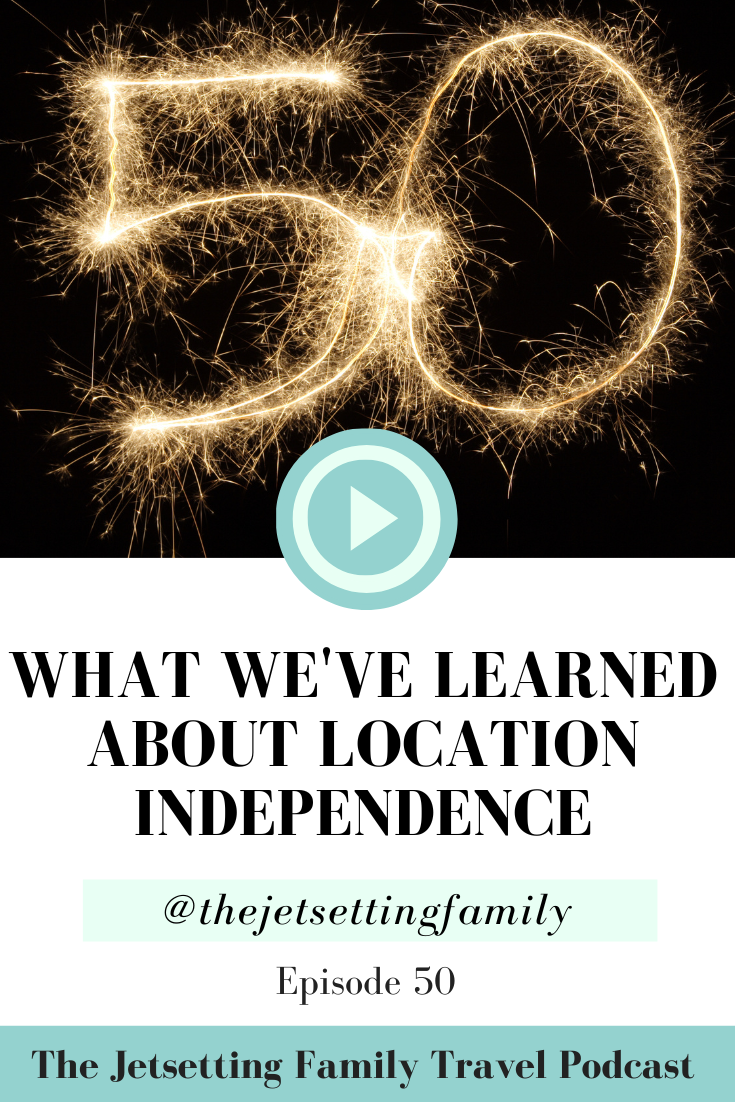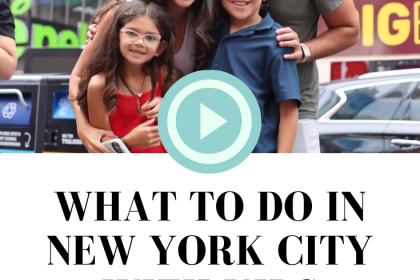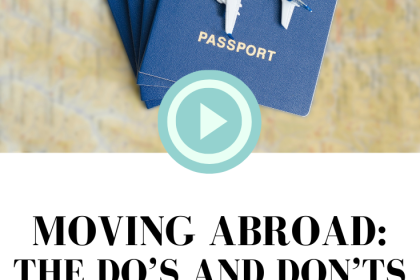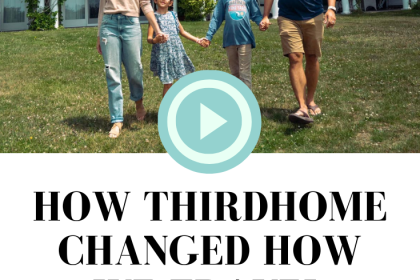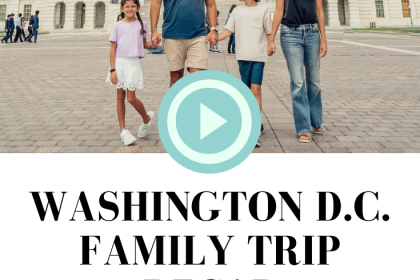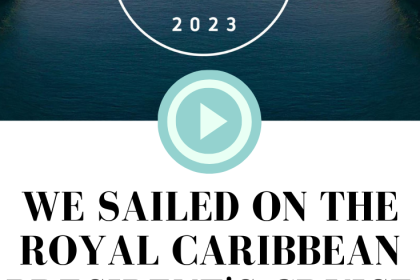This week we celebrate our 50th podcast episode by looking back on our 5-year journey to location independence. We cover what it means to us, the things that we’ve learned from it, and how we approach decisions with this guiding principle in mind. We hope you enjoy and looking forward to another 50 episodes!
Listen and Subscribe on: Apple Podcasts, Spotify, Google Podcasts
Transcript
Rod: Welcome to the Jetsetting Family Travel Podcast. I’m Rod. And I’m Jeff. And today is a very special episode because this is our 50th podcast episode. Woo-hoo.
Jess: Seems crazy. Well, I guess it seems wild to me because we started the podcast with seasons one and two, and then we took a huge, enormous break and it’s just crazy because we started back up this year and we just love it because we feel like we get so many messages from you guys. So thank you all for all the support and love you send us via email or on Instagram that you love the podcast because it motivates us to keep filming these and it’s been great.
I feel like I love this time with Rod every week filming these episodes and now we got to 50, so. And looking forward to making it to 100.
Rod: Yeah, looking back 50 episodes over five years doesn’t seem like that much, but when you really think about the kind of journey that we’ve been on and the manner in which we decided to do this podcast, it’s something that we’re proud of.
I mean, this podcast really, I don’t know if many of you know the story of how it started, so let me share with you that really quick. This podcast was first an idea that I pitched to a company called Castbox. And Castbox is a podcast company. At the time, they were trying to be like the Netflix of podcasts in which they were paying for original programming that would be exclusive and hosted on their platform.
So it’s like a podcast player, kind of like Apple Podcast or Google or Spotify. Now, And we pitched them this idea. This was when we were planning on starting our full-time travels in 2018, and we just thought, hey, a podcast might be something interesting where we’re sharing the adventures that were going on, the places that we’re visiting, tips on family travel and those kinds of things.
So we sent them an email of couple of weeks later, we had forgotten about that, but we heard back and they said, this is a great idea. Let’s start discussing it. And that’s really how this podcast was born. So that first season we were directly on Castbox, and then after that year, Castbox went in a different direction with their original programming.
They weren’t doing that anymore. So then we started to kind of take this journey on our own. We still had some podcast support from some of the team there, but now we are fully on solo and continuing on, and I think we’re going to hit 50 episodes this year alone too.
Jess: So, so it’s crazy. And it’s just, I will say I enjoy filming this podcast way more now that we have a home base.
Because guys, I wish I would’ve recorded more of the behind the scenes of the podcast. In season one and two, we had, I mean, we filmed in closets, we filmed in cars. I can’t remember who our guest was, but we had a guest on, I believe, season one, where right before filming started, there was an earthquake in Bali where we were, and we lost all electricity.
We’re trying to get in touch with them. We’re trying to find like a coworking space that might have electricity for us to go film at. And it was just, it was like, I love the podcast. Cause I almost felt like our content was so new. We were so in the moment. We were just on these crazy adventures. But finding where to film the podcast was so difficult to find a quiet place to find a place because we were with our kids where we could film when they weren’t bothering us, but yet not wake them up.
I mean, it was crazy. Some of the places we filmed this podcast.
Rod: Yeah, having a home base now where we’re filming or recording from the same space, it’s definitely a breath of fresh air. I mean, the stress of having the plan where things are going to be, is the internet going to be fast enough? Is there going to be noise?
Sometimes there was construction happening, so we have to go to like a sound booth. Somewhere in town or bring kids with us, asking them to be quiet. I mean, yeah, it’s been nutty. It’s been an adventure. But I think for the topic today, we don’t have a specific travel guide or tips on a specific destination, but what we wanted to talk about is the concept of location independence. And that’s something we’re coming up on five years of being location independent, I think this June. And we wanted to start this episode with the things that we’ve learned about location independence, about digital work, about family travel in these past five years. And then we’re going to finish off with a quick mail bag.
We’ve had a couple of questions that were sent our way from our audience on Instagram. So we’ll be answering those questions and that’ll be, yeah, that’ll be it for today.
Jess: Yeah. So what is location independence necessarily? Yeah. For us, that was a huge thing that once we settled down from Covid, once, like the Jetsetting Family came to an end, we realized it was going to be very hard for us to create content at the time.
And so there was a period Rod had to go back and find work to help. But for us, the number one priority with him going back to work wasn’t pay necessarily. It was remaining remote. Having remote work because for us, If you have a remote job or a digital job or anything that does not require you to be at a specific location or at an office, the freedom that gives a family, whether you still have a home base or are traveling full-time, the freedom of knowing.
You know, for us this summer we’re doing a one-month trip that might extend a two months. And knowing we have the flexibility to do that is a beautiful, beautiful, beautiful thing. Not everyone needs to prioritize in their life. That it depends. Some people are completely fine having roots and those roots being deep and not having the ability to pack up and go at any moment for me.
Oh, that’s a very confounding thought. Like, I just feel like I am trapped. And so having a location independent lifestyle for us is, I think something we will continue to prioritize. Even if that means we’re not making as much money, even if that means we’re going to go through some pros and cons of like, there are some cons to it, but for us that freedom is really, really, really worth it.
And so, Yeah. It’s different now. It’s definitely different to be location independent with a home base than without. Right.
Rod: I think, and it’s a good, good topic that you started on, Jess, because the, the first thing that I’ve learned is, or about location independence, is that it is more of a mindset than a situation.
Right. When we first started, we were traveling full-time. We didn’t have a home, and we felt that it was, may not necessarily the, the mindset of it, it’s more. You are either location, independent or you’re not. And. What I’ve learned is that there’s different forms to it. It doesn’t necessarily mean that you have a home base or not.
I mean, granted, we have been in that situation before, but we’ve also been traveling out of a suitcase. We’ve also been living with family. We’ve been staying with friends. We’ve been on a cruise ship for weeks at a time. I mean, Just the, the concept of it itself, I feel like to me is a mindset where if you’re, as Jess said, prioritizing flexibility, then being able to choose whether you have a home or not.
Whether you’re traveling fast or slow, if you are traveling at all. I think that’s what I’ve learned is that it’s not, it’s kind of hard to define and it seems really like weird just calling it a mindset, but that’s what works for me. Yes, Jess is looking at me like, that’s kind of weird. But no…
Jess: I think it’s true.
I think it’s just for me, just knowing we have that freedom. For example, podcast listeners, you’re going to get the first tidbit of some plans we have coming up. It’s not official yet. We have not announced anywhere, so it’s a listener special. Kidding? Oh yeah. Okay. We are considering moving to Mexico in August, for a eight month period, most likely for our kids to learn Spanish fluently and we may or may not end up going. We love, love, love our home, right? But for us to have our kids fluent when we are both fluent Spanish speakers and have done an awful job teaching them is something important to us. And just even having that option to consider this as something that’s potential that won’t disrupt our income in the sense that.
We do have jobs now that we can go for eight months and come back. And that freedom to be able to explore options, explore possibilities, explore those things are what led us to make huge career changes. In general, just to have that freedom to like have endless options of, you know, we love, love Florida and I totally see us coming back because we love it here.
But if one day it doesn’t serve us anymore, we’re not dependent on finding a new job or finding we can go anywhere in the world. Which I will say that’s a con because when we settle down during Covid, I mean, it’s one of those things when you have so many options, you have what? Decision paralysis is the word.
Oh, yeah. Yep. Trying to pick where to live when you can go anywhere in the world was extremely, extremely, extremely difficult. At one point, I was just kind of like, oh, at this point I just kind of want someone to be like, here’s where you need to be.
Rod: Yeah. Yeah. I think being location independent. And that mindset piece of it is like opening a big door.
And once you walk past the door, then you realize there’s like a million other doors that you can choose from and you are free to choose any of those. And this is back where that mindset piece comes to, right? We have a home here. But being location independent for us means that we’re not necessarily tied to living here full-time, right?
We take the summers off already in which when the kids are outta school, then we’re traveling. We’re on the road right now. Even the fact that our kids are enrolled in a school here isn’t something that necessarily forcing us to live here because we can always pick a different school or move to somewhere where there’s going to be a school that’s going to fit their needs that they have for, for example, going to Mexico and learning Spanish.
It’s all, it’s all based out of a goal that we have, and we’re not using our location as a limit or a barrier for us to reach that goal. Yeah. Yeah. Really, really exciting news. Yes. And, let’s talk some more about, you know, some of the things that we’ve learned. One of the questions that we get is, is it worth it?
And that’s a very difficult question to answer because I think it’s going to depend on. Everybody’s situations and you know, their, their willingness to, to commit to it or the just, I think there’s a certain point where you have to step past the fear that you have of the regret that if you did it and you didn’t like it that.
What would you do? Right. So for me, my answer and what I’ve learned is that it’s been completely worth it. I think the flexibility and the freedom to kind of choose our own fate has unlocked so many opportunities. It’s given us so many memorable, incredible experiences that it feels really hard to say if we needed to.
Settle down somewhere, not think about leaving or travel or necessarily having our own kind of jobs or, you know, business, then it would be a very interesting different experience that, I don’t know if we can go back to,
Jess: Yeah. I don’t know. And like to give a picture because maybe some of you haven’t been here from the beginning.
Rod was in the Air Force prior. Yeah. So like the Air Force is extremely restrictive in a lot of ways because not only are you tied to a location that you’re told to be at, they continuously move you. So it’s like, right, we were moving constantly, but we weren’t never having like a true say. I mean, you get to put in your preferences, like these are the top three places I want to move.
But if they tell you you’re moving somewhere out of those top three, I mean, you pack up and you go where you’re told. And so we had a very, very restrictive life as far as locations went right to complete freedom. It was a very, very big jump. I think thankfully now since Covid, there are so many remote jobs that it’s completely different than when we left in 2018.
I think remote jobs were harder to come by and there weren’t as many options. And for some of you out there, you might actually not have a lot of, what is it like opportunity costs? There might not be a lot of downswing because maybe you can find a remote job that’s the same pay, right?
Rod: Yeah. And location independence doesn’t mean that you have to start your own business or become a freelancer or something like that, right?
If you, if your company or if you have skills that are valuable to some other company that allows for remote or hybrid types of flexibility, then that’s an enabler in and of itself.
Jess: Yeah, I think for us, it was a little bit different because not only was it we’re switching to remote job, we were switching to like our own company.
Yeah. So there were so many risks associated with it. Right? Like, were we going to have an income? Were we, but for us at that time, that risk was so worth it, even though there were a lot of negative aspects to taking a leap.
Rod: Yeah, and it’s really, it’s really strange too. We’ve been hopping across different facets of that.
We’ve did have our own business for a while. When Covid hit, we kind of put that on the back burner a little bit. I went and got a traditional full-time job that was remote, but it was still working a nine to five kind of thing for a couple of years, and now we’re back to working on our business full-time.
So it’s, it’s this mindset again, it’s like you’re constantly evolving depending on the situation. But as long as you have that flexibility and freedom as like that main requirement, then that’s what’s going to guide your quest, I guess, for location independence.
Jess: I mean, I felt here were the pros and cons.
Diving a little bit deeper into location independent between working a remote job versus freelancing for yourself is when we had the remote job, when Rod had the remote job, I wasn’t working. There was no we in it. We had a lot more stability income wise. Yeah. I mean, he had a really decent paycheck.
We were doing really well, but when we were in Colombia last summer, rod was still working that job. It was really tricky because he had to work all day, like nine to five, nine to six. So I’m out exploring with the kids. We’re in Colombia, but it wasn’t, we, he didn’t have the flexibility with working for yourself and being remote, so.
Right. That was one of the big cons of that, but we still had the ability to pack up and go to Columbia, so it’s like there was still that huge pro. Otherwise, if he had a desk job, I would’ve had to take the kids by myself or stayed home. So it was like, I feel like a remote job where you don’t freelance is like that in between.
You don’t have the income insecurity or like the constant…
Rod: right? You can work anywhere, but you still have to work and your schedule is going to depend on the specifics of what your work situation is like.
Jess: So who knows? I love that we freelance and have location independence, but.
Rod: Yeah. Yeah. And I think with the other, on the flip side of that, kind of getting into the cons of it, it does get overwhelming at certain times.
I think from a routine perspective, it is possible to have a routine while being location independent, but you’re also, as we’ve mentioned before, you have so many possibilities and so many decisions that you can make as to are, am I going to start traveling and go somewhere? Are we going to go, you know, with the kids or is it just going to be one of us for a little bit?
I think those, those kinds of decisions can become overwhelming, but, I mean, as compared to just having a, I’d say a traditional lifestyle where you have your nine to five and the decision that you make is where you’re going to go on vacation or use your paid time off for that year. Right here, it’s different in which, yes, you can also use paid time off to travel and not have to work.
But if you have a job that’s remote and you want to travel and work then it just gets trickier in implementation, I’d say. But it’s something that you get used to, but it’s still, it can get tiring after a while to just constantly have to figure out, all right, I’m in a new place. Then I need to check what the Wi-Fi situation is.
Is there going to be in a lot of noise? It’s going to make it difficult for us to do our jobs and those kinds of factors that are always little wild cards. Maybe one at a time when you’re presented by it, it’s not that big of a deal, but just constantly over time, having those little things that are detracting from your experience just kind of gets to you sometimes.
And the last piece of what we learned about location independence is that it’s a family decision. Everyone in the family is going to have a different type of belief or attitude towards what location independence means to them and what level of it that they want to be at. So for example, when we were traveling full-time, our kids were two and five years old.
And they were at the stages of life in which as long as they were next to mom and dad, they were good, right? They were far more resilient than we expected them to be. They were able to understand and learn about our full-time travel adventures and the fast travel that we were doing. But over time, as we did more and more of it, and they got a little bit more mature, they started realizing.
They were missing developing those deep, long-term friendships. Seeing family since we happened to be across the world most of the time which made it very difficult to see family. And we changed our perspective and that’s when we transitioned from traveling full-time to finding a home base.
And this happened during the pandemic too, which we were kind of required to do that. But over time, and now that we’re here in Florida, we have a home base. They love their community here. And the fact that we’re considering going to Mexico, we know that it, it has to be temporary at this point because this is the environment and the arrangements and the type of lifestyle that they love.
So finding that balance between what we want. You know, our favorite thing to do is travel and see new places and, and do new things. But the kids right now, they crave that stability and those friendships and that closeness to family. And that’s something that you have to find. You know what’s going to work best for everyone.
And sometimes, yeah, you do have to make sacrifices here and there just to be able to make sure that each family member is getting to do their bucket list items.
Jess: So, yeah. And it’s funny because Santi, he loves school. He’s thriving in school, but he still asked to homeschool. I think he loves mom a lot, thankfully.
But my limit was, I’m fine homeschooling if we’re on the road. I feel like you can learn so much through hands-on experiences as we traveled. There’s new museums, there’s new architecture, there’s just so much to do. But I made it very clear to him, like at this point where we are right now, and this might change next year, I feel like things ebb and flow.
I don’t want to homeschool if we have a home base. Yeah. And I would prefer to not homeschool if only one child’s homeschooling instead of both. And so I think that was a preference thing for me. I’m like, I’m happy to homeschool again. But for me, I like to world school, I guess you could say, more than homeschool.
And so for Santi, he really wants community. So it’s like, well, if you want the community, you’re going to go to school. Right? And so it’s kind of just navigating each person’s non-negotiable, right? For Santi. Right now, he wants deep friendships and he wants to travel. He loves to travel, but he doesn’t want to travel year-round.
He wants to travel during summer, during breaks. Great. And so my non-negotiable is, is if we are home and we aren’t traveling, I do not want to homeschool. And I do think they’ve thrived in school, thankfully.
Rod: Right. Yeah, so, you know, location independence. We’d love to hear your thoughts on whether that is a goal of yours, whether that’s something that you’re doing now.
So always feel free to reach out to us @thejetsettingfamily. And before we close out this episode, we did want to answer a couple of questions that we did get from our community on Instagram. So I’m going to start off this one with, this one’s from @jomurray. And they said before you start doing collaborations, how much was your monthly spending? That’s a tough question to answer because it is highly dependent on your cost of living.
Jess: Yeah. It depended greatly for us. I will say it’s funny, Bali, I think we’ve done episodes on Bali. Bali. I love the people, but it’s not my favorite country in the world. Yeah. I would way rather spend time in other places personally.
But Bali was a place we went back to often we probably spent some of the most time in Bali during our full-time travels because it was very, very, very cheap. So our monthly spending would depend, like when we were in Australia, we were spending way more than we wished we were probably spending. How much would you guess a month?
We did a very bad job tracking it.
Rod: Yeah, probably close to $8,000.
Jess: It was. Food there was expensive. We had a hard time getting collaborations there at the time. Yeah. Lodging was expensive. We had a rental car, I believe we broke a laptop and a camera, so like, Australia was very expensive. And from Australia at that time, we had planned to go, I believe, to New Zealand or something next.
So we just,
Rod: yeah, we want, we were going to go to Fiji in, uh, Tahiti
Jess: and just realize, well, that we just can’t, we cannot keep doing this. And so, we actually ended up going on a cruise that we were hired and paid to do. But the plan before getting hired for the cruise was to go back to Bali. Because in Bali we could have happily spent $2,500 a month.
Yeah. Very, very cheap. Very, very cheap cost of living throughout Southeast Asia. I think now had I gone back after going to Cambodia, which was more towards the end and Vietnam of our Southeast Asia tour, I wish we would’ve gone back and spent more time in Cambodia. Cause it was ridiculously cheap.
We probably could have spent 2000 a month. Right, and lived in Cambodia and had a decent life. Another cheap, cheap place was Malaysia. You could spend very, very little and have a great time in Malaysia. So it really was dependent. I think for us back then, the goal would be four to 5,000 a month before we were doing collaborations was kind of the target budget.
So some months when it got like really over budget and we were burning through money quickly and we’d get nervous, it’d be like, what cheap country can we fly to next and kind of make up for that really expensive month. Yeah. Obviously, things got better as we did get more collaborations because even at first we weren’t getting paid to work for hotels.
We were just getting free stays for us as long as we weren’t paying for where to live. That gave us a lot of extra money to spend on excursions and on different other expenses that we might have wanted to do.
Rod: Yeah, and I think from the budgeting perspective, we did start, we saved a lot of money for a little over a year before we actually started traveling full-time.
So we had calculated, hey, if we’re going to be spending on average this much a month, then we will be able to travel full-time for about a. And then that runway ended up getting extended as we started getting these collaborations. So, just as Jess mentioned, when we overspent and overshot our budget in Australia, then we had plans to go somewhere cheaper or to go back to the US and spend time with family and use that as a time to, to reconnect before heading off to somewhere else.
That would be relatively lower cost of living like Mexico. So…
Jess: and there were times in Australia guys, I felt like a college student again, which is funny because I did a semester abroad in Australia in college. So I’d lived there before, but there were just excursions that were really expensive.
Thankfully we had some collaborations. Like we had a free helicopter tour and Great Barrier Reef Day, but there were other excursions in Australia that were extremely expensive and it was kind of like, but we’re here. Yeah. And we really want to do this. Yeah.
Rod: And it was like, and we can’t eat out anymore because yes, we can’t afford.
Jess: So then it was like we had this epic excursion and then we literally ate peanut butter and jelly and ramen noodles again. I’m like, oh god. This is like,
Rod: We sampled a whole lot of ramen in Australia and got very used to those peanut butter and jelly sandwiches. And so that’s fine because we got to pick, right?
Jess: Yeah. And I think you could definitely do Australia cheaper. We were being high maintenance in Australia and we wanted to stay in the heart of the city. We wanted to do all the amazing excursions. We, I mean, we just, You. I mean, you just have to decide what are you willing to sacrifice. So for us, we were willing to sacrifice really yummy food.
Except for Betty’s burgers. If you go to Australia and see a Betty’s burgers…
Rod: that place is fantastic. Yep.
Jess: But it’s a budget depended on country. But our. Our goal was four to 5,000 a month for the four of us. Yeah.
Rod: And speaking of food, this next question comes from @jesgamez they said or asked during full-time travel, how did you balance a healthy lifestyle. So much to do and eat?
Jess: I will say we probably did a good job balancing this because there’s one thing about our family y’all should know, is we are not foodies, which is probably why we’re willing to sacrifice food for excursions. So food’s not like something we… I mean, I know it’s an amazing cultural experience. It’s just not something our family particularly prioritizes and especially because Santi really struggles with food in general, even in the US and what he can eat. He has a very, very, very restrictive diet. And that means a lot of the restaurants we go to are very dependent on is there something they offer that Santi can eat. Right? And so that really. Our ability to taste a lot of things.
Rod: Yeah. I think in general though, I lost weight during our full-time travels just because. When you’re in a home situation and you have a pantry that’s stocked maybe with some snacks and things like that, it’s very easy for you to just make a quick decision to grab a bite to eat when you’re traveling full-time in a brand-new environment where you’re not necessarily sure what they have at a grocery store or at the restaurants close by.
We didn’t end up snacking a whole lot, I think, since we are also outside a lot, doing a lot of walking. We stayed close to cities where we’d walk around the cities and explore, so we ended up living more actively than we do right now when we’re basically working from home. Yeah, we’ll go and work out every now and then, but we also have.
So much more access to the type of food that we like, where that wasn’t necessarily the case when we were traveling full-time, so…
Jess: Well, and we were in Asia for like the first six months of full-time travel. Yeah. Which they just have a healthier diet. It’s a lot of rice. That’s a lot chicken, I think the, a lot less fast food.
But I will say our family, it’s embarrassing to say it, we probably saw a McDonald’s in every country we went to because of Santi’s restrictive diet. We would pick stuff up for him. I never eat at McDonald’s personally. I’d get street food first, but Uhhuh, I never went to a gym while we full-time travel.
I never really worked out. I agree with Rod. We did a lot of swimming, a lot of walking. So it somehow just managed to work out. Yeah. Yeah.
Rod: Okay. And last question for today. This one, comes from @sebastiansilva70 and their question is, do you own your Airbnbs? And I think this is the start of an interesting subject.
Maybe we’ll dedicate a full episode to it. But, for those of you that don’t know, we do have some short-term rentals and we do operate and property manage in another short-term rental in Mexico. So, we have two that we own in Florida. And, yes, we do own those, but then the other one in Mexico, we just operate it and run the, the revenue and expenses and plan the things through Airbnb.
So for that, I think it’s, it’s a cool way for us to generate revenue as a business and host other people, and also start building out like a real estate portfolio that gives us flexibility. And it’s in places that we love as well. So, when we go visit, we have a place to stay. And yeah, I think it’s, it’s a viable way in terms of location, independence, property managing, and operating short-term rentals through Airbnb or Vrbo, then that’s, that’s a way that you can kind of dabble in that location independent lifestyle, because even though we.
The places that we own, we don’t live next to them, so we operate them remotely. We have teams in place for maintenance, cleaning and things like that. So that we’re able to just run them while we’re away from that specific city.
Jess: Something important to note is we did not own those when we full-time travel.
We bought those Yeah. Post settling down after Covid, so that wasn’t part of our income wall. Full-time traveling. But it’s something we are really hoping to continue to expand and explore. So that years down the road when everything’s paid off, it is a very good source of passive income, right?
Some weeks it’s very active. I wouldn’t call it passive. Depends on the guests, but yeah. My goal, I always tell Rod, which I guess we’ll go into it deeper in a future episode, is once all the properties are paid off in full, I wouldn’t mind hiring a property management company to manage them and losing that percentage just to not have to be the ones operating it.
Totally, yeah. And it would be true, true passive income. So hopefully years down the road when we travel full-time again, that will be, yeah, our income source.
Rod: This is one another one of those like little micro things that happen when, when you’re dealing with it at an individual basis, it’s not a big deal.
But if your two Airbnbs are both occupied and both of your guests are being more difficult than what we’re used to, and it just gets a little overwhelming too.
Jess: It can, has its moments. But overall, it’s been a really big blessing for us. It’s brought in actually more income than I had thought it would’ve.
First purchased. And so that’s been a big relief for us because even though the Jetsetting Family we’re working really hard and doing things on that front, just having an extra cushion of any kind, is a huge blessing.
Rod: Right. So, with that, I think, that wraps it up for today. Once again, thank you for listening.
As always, feel free to reach out to us. You can email us at [email protected], find us on Instagram @thejetsettingfamily. And if you really enjoy the episode, of course subscribe on whichever podcast platform that you are listening to. And for those of you that started with original cast box, when we.
Uh, a original partner for that company. Thank you for sticking around. I know there’s been a hiatus for a few years in between seasons and the good thing now is now we’re running it on our own. We’ve got our own schedule, and we will be coming to you every Tuesday.
Jess: Yeah, we hope that you’ll be here when we hit episode 100.
Oh, yeah. Yeah. So, we’ll see. And if you guys ever have a topic we haven’t covered that you’d love to hear, email us. We’re always open to new topic ideas, and we’re excited not only to start talking about other topics like Airbnb more, but to maybe start bringing guests back,
Rod: So, oh yeah, for sure. All righty.
Jess: Well, thank you and until next week, Happy Jetsetting!
